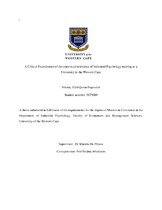A critical examination of the contextual relevance of industrial psychology training at a University in the Western Cape
Abstract
The dominant influence of Western and European psychology on the African educational system brought about a specific point of view for the teaching curriculum (Heleta, 2016), which also spilled over into the workplace and job training practices. The present study gave a brief review of the history and development of the Industrial Psychology curriculum in South African higher education institutions. It also highlighted the dominant influence of Western and European psychology on the African educational system that brought about a non-African (i.e. Western scientific model) psychological discipline in the teaching curriculum. The study sought to examine the contextual relevance of Industrial Psychology training at a University in the Western Cape. Furthermore, the study investigated how the concepts and frameworks of Euro-Western Industrial Psychology affect graduates entering into a multi-cultural work context. The need was found for a teaching and learning curriculum that prepares students with multi-cultural knowledge, thus enabling graduates to embrace a diverse work environment. The researcher followed a qualitative research design with semi-structured interviews to collect data. The method of thematic analyses was used and the themes identified manually from the transcribed interviews. The researcher followed a qualitative research design with semi-structured interviews to collect data. The method of thematic analyses was used and the themes identified manually from the transcribed interviews. The researcher followed a qualitative research design with semi-structured interviews to collect data. The method of thematic analyses was used and the themes identified manually from the transcribed interviews. The researcher followed a qualitative research design with semi-structured interviews to collect data. The method of thematic analyses was used and the themes identified manually from the transcribed interviews. These themes were analysed to provide findings from which relevant conclusions could be drawn. The findings varied due to diverse groups of participants with differing workplace expectations. However, participants agreed on the need for introducing more African examples in the teaching and learning of Industrial Psychology, to ensure the curriculum is applicable to a work context of a developing country such as South Africa. Ethical considerations of the study did adhere to the guidelines from the Ethics Committee of the particular University. Recommendations were made to help other universities in South Africa see the need for not only contextualising the curriculum of Industrial Psychology, but redefining teaching techniques in line with expectations from the industry. Ethical considerations of the study did adhere to the guidelines from the Ethics Committee of the particular University. Recommendations were made to help other universities Ethical considerations of the study did adhere to the guidelines from the Ethics Committee of the particular University. Recommendations were made to help other universities in South Africa see the need for not only contextualising the curriculum of Industrial Psychology, but redefining teaching techniques in line with expectations from the industry. These themes were analysed to provide findings from which relevant conclusions could be drawn. The findings varied due to diverse groups of participants with differing workplace expectations. However, participants agreed on the need for introducing more African examples in the teaching and learning of Industrial Psychology, to ensure the curriculum is applicable to a work context of a developing country such as South Africa. Ethical considerations of the study did adhere to the guidelines from the Ethics Committee of the particular University. Recommendations were made to help other universities in South Africa see the need for not only contextualising the curriculum of Industrial Psychology, but redefining teaching techniques in line with expectations from the industry. Ethical considerations of the study did adhere to the guidelines from the Ethics Committee of the particular University. Recommendations were made to help other universities Ethical considerations of the study did adhere to the guidelines from the Ethics Committee of the particular University.Ethical considerations of the study did adhere to the guidelines from the Ethics Committee of the particular University. Recommendations were made to help other universities in South Africa see the need for not only contextualising the curriculum of Industrial Psychology, but redefining teaching techniques in line with expectations from the industry. The researcher followed a qualitative research design with semi-structured interviews to collect data. The researcher followed a qualitative research design with semi-structured interviews to collect data. The method of thematic analyses was used and the themes identified manually from the transcribed interviews. Ethical considerations of the study did adhere to the guidelines from the Ethics Committee of the particular University. Recommendations were made to help other universities in South Africa see the need for not only contextualising the curriculum of Industrial Psychology, but redefining teaching techniques in line with expectations from the industry. Recommendations were made to help other universities in South Africa see the need for not only contextualising the curriculum of Industrial Psychology, but redefining teaching techniques in line with expectations from the industry.

